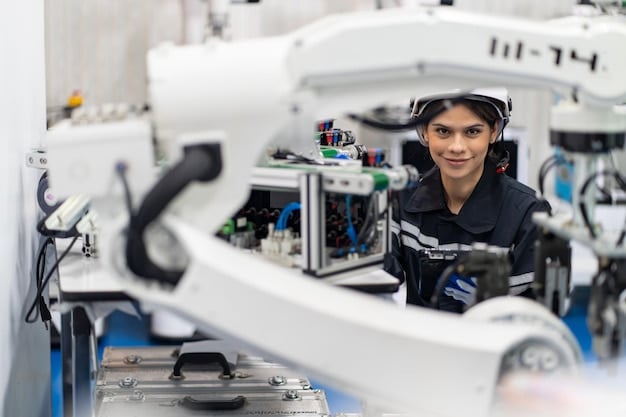Mexico’s Automotive Industry Boom: Opportunities for US Suppliers 2025

Mexico’s automotive industry boom, propelled by nearshoring and evolving global supply chains, presents significant opportunities for US suppliers in 2025, driven by increased production capacity, technological advancements, and a demand for high-value components.
The Mexican automotive industry is experiencing an unprecedented surge, positioning itself as a pivotal hub in the global supply chain. This growth, particularly fueled by nearshoring trends, is creating a dynamic landscape ripe with opportunities. For US suppliers, understanding the intricacies of this expansion is crucial for strategic positioning and leveraging the burgeoning demand in 2025. This article delves into the transformative forces shaping Mexico’s Automotive Industry Boom: Key Opportunities for US Suppliers in 2025.
Understanding the Nearshoring Phenomenon in Mexican Automotive
The concept of nearshoring has emerged as a dominant force reshaping global manufacturing and supply chains, particularly within the automotive sector. This strategic shift involves relocating production facilities and supply networks closer to the target markets, offering significant advantages over traditional offshore models. For Mexico, its geographic proximity to the United States, coupled with established trade agreements like the USMCA (United States-Mexico-Canada Agreement), makes it an exceptionally attractive destination for companies seeking to optimize their operations and reduce logistical complexities.
The push for nearshoring in the automotive industry is multifaceted. Geopolitical tensions, disruptions caused by events like the COVID-19 pandemic, and a growing emphasis on supply chain resilience have highlighted the vulnerabilities of relying on distant manufacturing bases. Companies are increasingly prioritizing stability, speed to market, and reduced transportation costs. Mexico’s robust manufacturing infrastructure, skilled labor force, and competitive operating costs further solidify its appeal as a nearshoring hub for automotive production.
Driving Factors Behind Nearshoring to Mexico
Several key elements contribute to Mexico’s magnetic pull for automotive nearshoring initiatives. These factors collectively create an environment conducive to sustained growth and investment, directly impacting the demand for diverse supplier capabilities. Understanding these drivers is essential for US companies looking to penetrate or expand within the Mexican market.
- Geographic Proximity: Direct access to the US automotive market significantly reduces shipping times and costs.
- USMCA Benefits: The trade agreement provides duty-free access and robust legal frameworks, fostering predictable trade relations.
- Skilled Labor Pool: Mexico boasts a growing workforce with expertise in manufacturing and engineering.
- Established Supply Chain Ecosystem: Existing automotive clusters offer a mature network of suppliers and infrastructure.
- Cost Competitiveness: Lower labor and operational costs compared to the US can enhance profitability for manufacturers.
The strategic implications of this nearshoring surge are profound for US suppliers. As automotive production ramps up in Mexico, there is a corresponding surge in demand for components, technologies, and services across the entire value chain. This shift necessitates a re-evaluation of supplier strategies, identifying where current capabilities align with emerging needs in the Mexican market. The closer integration of these supply chains also implies a greater need for seamless logistics and collaborative innovation between US and Mexican entities.
Impact on Automotive Production and Capacity
The influx of nearshoring investments has a direct and measurable impact on Mexico’s automotive production capacity. New plants are being built, existing facilities are undergoing significant expansions, and manufacturing lines are being upgraded with advanced technologies. This expansion translates into higher volumes of vehicles and components being produced within Mexico, creating a substantial demand pull for upstream suppliers.
For US suppliers, this means an expanding market at their doorstep. Whether it’s providing raw materials, specialized components, or advanced manufacturing equipment, the growth in Mexican production capacity directly opens avenues for increased sales and partnerships. Preparing for this heightened demand involves understanding the specific needs of the new and expanded facilities, anticipating technological shifts, and building strong relationships with key Mexican original equipment manufacturers (OEMs) and Tier 1 suppliers.
Emerging Technologies and Innovation in Manufacturing
The Mexican automotive sector is not merely expanding in volume; it is also evolving technologically. The drive for efficiency, sustainability, and quality is pushing manufacturers to adopt cutting-edge innovations in their production processes. This embrace of advanced technologies creates a significant opportunity for US suppliers specializing in high-tech solutions and innovative manufacturing practices.
From advanced robotics and automation to the integration of AI and data analytics, the future of automotive manufacturing in Mexico is increasingly smart and connected. Suppliers who can offer solutions that enhance productivity, reduce waste, and improve product quality will find themselves in high demand. This extends beyond the direct manufacturing process to areas like supply chain management, quality control, and even workforce training, where technological solutions can add significant value.

Automation and Robotics in Production Lines
Automation and robotics are no longer futuristic concepts but essential components of modern automotive manufacturing. In Mexico, as production scales and precision demands increase, the adoption of robotic systems for tasks like welding, painting, assembly, and inspection is accelerating. This trend offers a direct avenue for US suppliers of industrial robots, automated machinery, and related software solutions.
Beyond the robots themselves, there is a substantial market for complementary technologies such as advanced sensors, vision systems, and integration services. US companies with expertise in these areas can play a crucial role in helping Mexican manufacturers implement and optimize their automated production lines. The focus is not just on replacing human labor, but on enhancing efficiency, consistency, and safety, areas where advanced automation excels.
Industry 4.0 and Smart Manufacturing
The principles of Industry 4.0 are gaining traction within Mexico’s automotive plants, marking a shift towards smart manufacturing environments. This involves the integration of cyber-physical systems, the Internet of Things (IoT), cloud computing, and big data analytics to create highly connected and intelligent factories. For suppliers, this paradigm shift opens doors to providing solutions that facilitate data exchange, real-time monitoring, predictive maintenance, and optimized resource allocation.
The demand for expertise in areas like industrial IoT platforms, cybersecurity solutions for operational technology (OT) networks, and data visualization tools is growing. US technology firms with a strong background in these sophisticated areas will find ample opportunities to partner with Mexican automotive companies looking to elevate their manufacturing capabilities. The ability to offer holistic solutions that encompass both hardware and software will be a significant competitive advantage.
- IoT Sensors and Devices: For real-time monitoring of machinery and processes.
- Cybersecurity Solutions: Protecting interconnected systems from evolving threats.
- Data Analytics Platforms: Transforming raw data into actionable insights for efficiency and quality.
- Predictive Maintenance Software: Reducing downtime and optimizing equipment lifespan.
The strategic deployment of Industry 4.0 technologies is critical for Mexico to maintain its competitive edge in the global automotive landscape. As such, collaborations with US companies at the forefront of these innovations will be increasingly vital. Suppliers who can demonstrate a clear return on investment through enhanced efficiency and reduced operational costs will be particularly well-positioned.
Sustainability and Green Manufacturing Initiatives
Sustainability is becoming a non-negotiable aspect of automotive manufacturing worldwide, and Mexico is no exception. There is a growing emphasis on reducing environmental impact through more efficient resource use, waste reduction, and the adoption of greener manufacturing processes. This trend creates new market segments for US suppliers offering environmentally friendly materials, energy-efficient technologies, and waste management solutions.
Opportunities exist in areas such as renewable energy integration for factory operations, advanced filtration systems to reduce emissions, and the development of lightweight and recycled materials for vehicle components. Automotive companies in Mexico are increasingly looking for partners who can help them achieve their sustainability goals, not only to comply with regulations but also to appeal to environmentally conscious consumers and supply chain partners. Demonstrating a commitment to and expertise in green manufacturing practices will be a key differentiator for US suppliers in 2025.
Specific High-Value Component Opportunities
As Mexico’s automotive industry matures and shifts towards more advanced vehicle production, the demand for sophisticated, high-value components escalates. This presents a golden opportunity for US suppliers traditionally specializing in these cutting-edge parts, providing an avenue to leverage their established expertise and technological superiority.
Advanced Driver-Assistance Systems (ADAS) Components
The global push towards safer and more autonomous vehicles means that Advanced Driver-Assistance Systems (ADAS) are becoming standard features, even in entry-level models. This trend significantly increases the demand for complex electronic components, sensors, and software that power these systems. For US suppliers, this represents a substantial market for components such as:
- Radar and LiDAR sensors: Critical for object detection and distance measurement.
- Cameras and imaging systems: Enabling features like lane keeping and blind-spot monitoring.
- Electronic Control Units (ECUs): The brains behind the ADAS functionalities.
- Advanced wiring harnesses: Designed to carry high-speed data for complex sensor networks.
US companies with a track record in developing and manufacturing these specialized components are in a prime position to supply the growing Mexican automotive production. The focus on quality, reliability, and precision in ADAS components aligns well with the strengths of many US-based suppliers, offering a distinct competitive advantage.
Electric Vehicle (EV) Powertrain and Battery Components
The transition to electric vehicles is a global phenomenon, and Mexico is rapidly expanding its EV manufacturing capabilities. This shift fundamentally alters the demand for traditional internal combustion engine (ICE) components, replacing them with new, specialized EV parts. US suppliers can capitalize on this transformation by providing:
- Battery cell components: Anode, cathode, electrolyte, and separator materials.
- Battery management systems (BMS): Crucial for battery safety and performance.
- Electric motors and inverters: Core components of the EV powertrain.
- Charging infrastructure components: Connectors, cables, and charging station supply parts.
The complexity and high-tech nature of EV components mean that quality and innovation are paramount. US suppliers who have invested in R&D and possess established manufacturing processes for these critical parts will find a receptive market in Mexico as production of electric vehicles continues to scale. Early engagement with Mexican OEMs and Tier 1 suppliers involved in EV production is key to securing these opportunities.
Lightweight Materials and Composites
Fuel efficiency and performance remain critical in vehicle design, leading to a continuous demand for lighter vehicles. This drives innovation in materials science, promoting the use of lightweight alloys and advanced composites. US suppliers specializing in these materials can find significant opportunities in Mexico, particularly for components that benefit from weight reduction without compromising safety or structural integrity.
Opportunities include supplying advanced aluminum alloys, high-strength steels, carbon fiber composites, and various plastic and polymer blends. As vehicle designs become more sophisticated, the integration of these materials often requires specialized manufacturing processes, offering further avenues for expertise sharing and technology transfer from US companies to their Mexican counterparts.
Logistics, Supply Chain Optimization, and Infrastructure
The burgeoning automotive industry in Mexico, coupled with the strategic importance of nearshoring, places immense pressure and opportunity on logistics and supply chain optimization. Efficient and reliable movement of goods, from raw materials to finished vehicles, is paramount. US suppliers with expertise in logistics, warehousing, and supply chain technologies can carve out significant niches in this evolving landscape.

Cross-Border Logistics and Customs Management
The intricate nature of cross-border trade between the US and Mexico demands specialized knowledge and efficient processes. For automotive suppliers, navigating customs regulations, optimizing transit times, and ensuring compliance is critical to timely delivery and cost effectiveness. US companies offering services in:
- Customs brokerage: Expert handling of import/export documentation and duties.
- Freight forwarding: Efficient coordination of shipments across borders.
- Supply chain visibility solutions: Real-time tracking and monitoring of goods in transit.
- Warehousing and distribution: Strategic facilities near border crossings and manufacturing hubs.
will find significant demand. The emphasis is on seamless integration and minimizing potential delays, ensuring that the components reach production lines precisely when needed. Building robust relationships with Mexican logistics providers and understanding local regulations will be vital for successful cross-border operations.
JIT (Just-in-Time) and JCL (Just-in-Sequence) Deliveries
Modern automotive manufacturing relies heavily on Just-in-Time (JIT) and Just-in-Sequence (JIS) delivery systems to minimize inventory, reduce waste, and optimize production flow. As Mexican automotive plants scale up, the demand for suppliers capable of adhering to these stringent delivery requirements intensifies. This is where US logistics and supply chain management firms can offer a competitive advantage.
Providing JIT/JIS services requires sophisticated planning, precise coordination, and robust IT systems. US suppliers who can demonstrate their ability to consistently meet these complex logistical demands—delivering the right part, to the right place, at the right time, in the right sequence—will be indispensable partners for Mexican OEMs and Tier 1s. This often involves establishing local presence or strong partnerships within Mexico to manage the last-mile delivery and warehousing components of the supply chain.
Digitalization of Supply Chains
The drive towards Industry 4.0 extends beyond the factory floor into the entire supply chain. Digitalizing supply chain operations through advanced software, predictive analytics, and blockchain technology offers opportunities to enhance transparency, efficiency, and resilience. For US tech and logistics companies, this means providing solutions that:
- Integrate data: Connecting disparate systems across the supply chain.
- Predict disruptions: Using AI and data to anticipate and mitigate potential issues.
- Track and trace: Ensuring full visibility of components from source to factory.
- Optimize routing: Leveraging algorithms for the most efficient transport paths.
The ability to offer comprehensive digital supply chain solutions, from planning and procurement to logistics and inventory management, will be a key differentiator for US suppliers in 2025. Mexican automotive companies are increasingly investing in these technologies to ensure their supply chains are robust, agile, and cost-effective in a dynamic global environment.
Workforce Development and Skill Enhancement
The rapid expansion and technological advancement of Mexico’s automotive industry necessitate a highly skilled workforce capable of operating and maintaining sophisticated machinery and processes. This creates significant opportunities for US suppliers and educational institutions specializing in workforce training, skill development, and technical education.
Training Programs for Advanced Manufacturing
As automation, robotics, and Industry 4.0 technologies become more prevalent in Mexican automotive plants, there is a growing need for training programs that impart the necessary skills to the local workforce. US suppliers with expertise in these areas can offer:
- Technical training: For operating and programming advanced machinery.
- Maintenance and repair: Specialized courses for complex robotic systems and smart factory equipment.
- Data analytics and software skills: For managing and interpreting data from connected systems.
- Quality control and assurance: Training focused on new methodologies driven by automation.
Collaborations between US educational institutions, technical colleges, and industrial training providers with Mexican counterparts or directly with local manufacturers can be highly beneficial. These partnerships not only support the Mexican industry but also open new revenue streams and influence the adoption of US technologies and standards.
Development of Specialized Technical Skills
The shift towards EV production and ADAS components requires very specific technical skills that may not be widely available in traditional automotive training programs. US suppliers involved in these high-tech sectors intimately understand the skill sets required for their components and systems. They can play a vital role in developing programs for:
- EV battery manufacturing and assembly: Handling and integrating high-voltage battery systems.
- ADAS calibration and diagnostics: Ensuring the precise functioning of complex sensor systems.
- Cyber-physical system integration: Bridging the gap between IT and operational technology.
Investing in the development of these specialized skills within the Mexican workforce can directly enhance the adoption and effective use of US-supplied components and technologies. This proactive approach not only builds capacity but also fosters deeper, long-term partnerships, ensuring a steady demand for high-value components and services in 2025 and beyond.
Regulatory Compliance and Quality Assurance Services
Operating within the highly regulated automotive sector, particularly in an international context, demands meticulous attention to compliance and quality assurance. For US suppliers, offering expertise and services in these areas can be a significant value proposition for Mexican manufacturers and for ensuring their own components meet necessary standards globally.
Adherence to USMCA and International Standards
The USMCA is a cornerstone of North American automotive trade, setting strict rules of origin and other requirements. Ensuring compliance with these regulations is crucial for manufacturers in Mexico to benefit from duty-free access to the US market. US suppliers can assist by:
- Providing compliance auditing services: Verifying that production processes and components meet USMCA criteria.
- Offering consulting on trade policies: Guiding Mexican partners through the complexities of cross-border trade.
- Ensuring product conformity: Helping components meet international quality and safety standards (e.g., ISO/TS 16949, IATF 16949).
Beyond USMCA, adherence to broader international automotive standards is essential for global competitiveness. US testing labs, certification bodies, and consulting firms can provide invaluable services, ensuring that components manufactured or assembled in Mexico are accepted worldwide. This expertise is particularly important as Mexico looks to export vehicles and components to diverse markets beyond North America.
Quality Control and Testing Services
Maintaining high quality is paramount in the automotive industry, where defects can lead to costly recalls and reputational damage. As production volumes increase and technological complexity grows in Mexico, the demand for robust quality control and testing services escalates. US suppliers can identify opportunities in offering:
- Advanced testing equipment: For material analysis, component durability, and functional performance.
- Automated inspection systems: Leveraging vision systems and AI for defect detection on production lines.
- Quality management software: Tools for tracking non-conformances, managing corrective actions, and statistical process control.
- Third-party quality assurance: Independent auditing and testing to ensure compliance and performance.
The provision of these services not only helps Mexican manufacturers meet stringent quality requirements set by global OEMs but also mitigates risks within the supply chain. US companies that can demonstrate a strong commitment to quality and possess advanced capabilities in testing and inspection will be valued partners in the Mexican automotive ecosystem, reinforcing the reliability of components manufactured there.
Financing and Investment Opportunities for US Suppliers
The surging growth in Mexico’s automotive sector presents a compelling case for US suppliers to not only export their products but also to consider direct investment. Establishing a local presence, whether through manufacturing facilities, distribution centers, or joint ventures, can significantly enhance market access and competitiveness. This requires navigating various financing and investment avenues.
Government Incentives and Programs
Both the Mexican and US governments offer various incentives and programs designed to promote cross-border trade, investment, and nearshoring initiatives. For US suppliers, understanding and leveraging these programs can provide crucial financial and strategic support for establishing or expanding operations in Mexico. These may include:
- Tax incentives: Reductions or exemptions on certain taxes for new investments.
- Export financing: Loans or guarantees from US government agencies to facilitate exports.
- Grants for R&D: Support for innovation in specific industry sectors.
- Special economic zones: Areas offering preferential customs regimes and infrastructure support.
Researching and applying for these programs can significantly de-risk investments and improve the financial viability of entering the Mexican market. Collaborating with local Mexican agencies and US trade representatives can help identify the most relevant and beneficial incentives.
Private Equity and Venture Capital Funding
Beyond government support, the robust growth of the Mexican automotive sector is attracting significant interest from private equity firms and venture capitalists. US suppliers, particularly those offering innovative technologies or specialized services, may find opportunities for funding through these private sources. This can facilitate:
- Factory expansions: Capital for increasing production capacity.
- Technology upgrades: Investment in advanced machinery and Industry 4.0 solutions.
- Joint ventures and acquisitions: Funding for strategic partnerships with Mexican companies.
- Market entry strategies: Capital to establish a new footprint in Mexico.
Successful engagement with private investors typically requires a strong business plan, clear demonstration of market opportunity, and a solid management team. US suppliers who can effectively articulate their value proposition within the context of Mexico’s automotive boom will be well-positioned to attract private funding in 2025.
Strategic Partnerships and Joint Ventures
For many US suppliers, the most effective entry strategy into the Mexican market is through strategic partnerships or joint ventures with established Mexican companies. This approach leverages local expertise, reduces market entry barriers, and often provides access to pre-existing supply chains and customer relationships. These partnerships can take various forms:
- Co-manufacturing agreements: Producing components together.
- Distribution agreements: Utilizing a Mexican partner’s sales and distribution network.
- Technology licensing: Allowing Mexican firms to produce under license.
- Equity joint ventures: Creating a new entity with shared ownership and resources.
These collaborations are particularly valuable for navigating local regulations, understanding cultural nuances, and building trust within the Mexican business community. For US suppliers looking to secure long-term opportunities in 2025 and beyond, forging strong, mutually beneficial partnerships will be a cornerstone of their success in Mexico’s booming automotive industry.
| Key Opportunity | Brief Description |
|---|---|
| 🌎 Nearshoring Growth | Increased production relocation to Mexico drives demand for varied US components and services. |
| 🤖 Advanced Manufacturing | Demand for US robotics, automation, and Industry 4.0 tech in Mexican factories soars. |
| 💡 High-Value Components | Opportunities in ADAS, EV powertrains, and lightweight materials for US specialized suppliers. |
| 🚚 Supply Chain & Logistics | US expertise in cross-border logistics, JIT/JIS, and digital supply chain solutions is highly valued. |
Frequently Asked Questions about Mexico’s Automotive Industry & US Suppliers
▼
The primary drivers are nearshoring trends, where companies relocate production closer to the US market to enhance supply chain resilience and reduce logistics costs. Favorable trade agreements like USMCA also play a crucial role, alongside Mexico’s competitive labor costs and an established manufacturing ecosystem.
▼
US technology suppliers can find opportunities in providing advanced manufacturing solutions such as robotics, automation systems, Industry 4.0 technologies (IoT, AI, data analytics), and software for smart factories. There’s also demand for solutions focused on sustainability and green manufacturing processes.
▼
The EV transition is critically important, opening new market segments for US suppliers of EV powertrain components, battery technology, charging infrastructure, and related electronics. As Mexico scales up EV production, demand for these specialized, high-value components will continue to rise significantly.
▼
Challenges can include navigating complex cross-border logistics and customs procedures, understanding local business culture, and ensuring compliance with Mexican specific regulations. Building strong relationships with local partners and carefully researching market dynamics are key to overcoming these hurdles.
▼
Workforce development is crucial as the Mexican industry advances technologically. US suppliers can capitalize by offering training programs for advanced manufacturing techniques, specialized EV and ADAS skills, and overall technical education, contributing to a capable workforce while embedding their technologies locally.
Conclusion
Mexico’s automotive industry is unequivocally in a phase of robust expansion, driven by strategic nearshoring and a commitment to technological advancement. For US suppliers, this represents a unique convergence of opportunity, demanding a proactive and informed approach. By anticipating the evolving needs for high-value components, embracing digital transformation in supply chains, and engaging in collaborative skill development, US businesses can solidify their position as indispensable partners in this thriving sector. The dynamic interplay between these two economies promises a mutually beneficial future, where innovation and strategic collaboration propel both industries forward.



